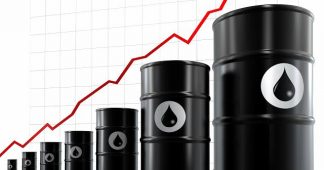Authored by Pantheon Macro’s Ian Shepherson
In one line: Iran will respond; the how and when is uncertain but full-scale war is unlikely.
It’s hard to overstate the geopolitical importance of Friday’s assassination of Qassim Soleimani, architect of Iran’s external military activity for more than 20 years and perhaps the most powerful man in the country after the Supreme Leader. For deep background on Maj. Gen. Soleimani and his importance in Iran’s military activity across the Middle East, both direct and via numerous proxies, see this piece from the New Yorker: https://www.newyorker.com/magazine/2013/09/30/the-shadow-commander
Iran right now is reeling from the assassination, but the leadership is dominated by hardliners and the question is how, not whether, they will respond. For markets, the key issue is the impact of the Iranian response on oil prices.
Our base case here is that a full-blown war between the U.S. and Iran is unlikely, though we appreciate the old adage that nothing brings a country together more effectively than an external threat, and Iran’s government right now is extremely unpopular. Sanctions imposed by the U.S. have crushed the economy and driven up inflation, triggering protests last month in which several hundred protesters were killed by army and police. It is reasonable to think, then, that the leadership will seek to use the assassination to divert attention from the grim economy. But Iran’s leaders probably aren’t suicidal; we doubt they will take action that will trigger air strikes on Tehran. The infrastructure of the oil sector, though, is a likely target in the event of tit-for-tat escalation.
Iran’s military reach via proxies across the Middle East gives the leadership plenty of options, including retaliatory assassination attempts, kidnappings, bombings of U.S. government facilities, and attacks on shipping and other privately-owned U.S. entities. Iran might also seek to draw Israel into a conflict via Hezbollah in Lebanon. We can’t rule out some sort of grand-scale attack, but an array of smaller-scale activity is our core bet. The risk that something bigger will trigger a real war, however, likely will put a premium on oil prices for the next few months, at least.
Higher oil prices represent a tax on oil consumers and a windfall for producers. World oil consumption is about 100M barrels per day, so each five dollars on the prices is equivalent to an annualized tax of about $183B per year, or 0.1% of global GDP. The U.S., however, is both a huge oil producer and a consumer. Domestic production runs at almost 13M bpd, with consumption at 21Mbpd. That would seem to suggest that the net effect of higher prices on the U.S. would be to depress economic growth, but recent experience points in the opposite direction, because oil sector capex, in the era of shale, is acutely sensitive to prices, even in the short term. When oil prices collapsed between spring 2014 and early 2016, the ensuing plunge in capital spending in the oil sector outweighed the boost to consumers’ real income from cheaper gasoline and heating oil, and overall economic growth slowed markedly. This story played out in reverse when oil prices rebounded in the three years through spring 2018, and economic growth picked up even as consumers’ real incomes were hit.
Oil production has risen by about 40% since late 2014, so the net boost to U.S. economic growth of a sustained jump in oil prices probably has increased. The Fed has acknowledged publicly that higher oil prices no longer reduce economic growth, but conventional wisdom in markets and the media has yet to catch up. If events in the Middle East drive oil prices up substantially, markets probably will become nervous about growth and will push the Fed to respond with lower interest rates.
Policymakers are unlikely to oblige, in our view, given their understanding of the impact of higher oil prices, the tightness of the labor market and the coming increase in core inflation from tariff pass-through and a run of adverse base effects. The likely further weakening of the dollar, as capital heads to safer havens and the Fed continues its bill-buying program, will add to the case against easing domestic policy.
The wild card is whether turmoil in the Middle East triggers a sustained sell-off in equities, depressing business and consumer confidence to the point where labor market and inflation concerns become secondary. We’d be surprised—the plunge in S&P futures is just the initial knee-jerk response—but if Iran takes more drastic action than we are expecting, it will become a real risk. In that case, the Fed might have no choice but to ease, especially if credit markets seize-up too. In the meantime, expect defensive stocks to outperform, with downward pressure on Treasury yields and gains for safe-haven currencies, until Iran’s response becomes clear. To repeat: Iran will respond.











